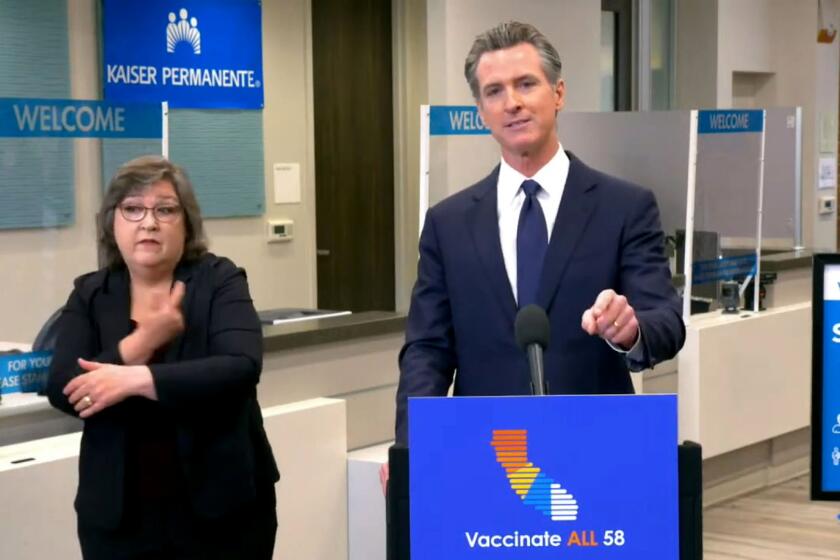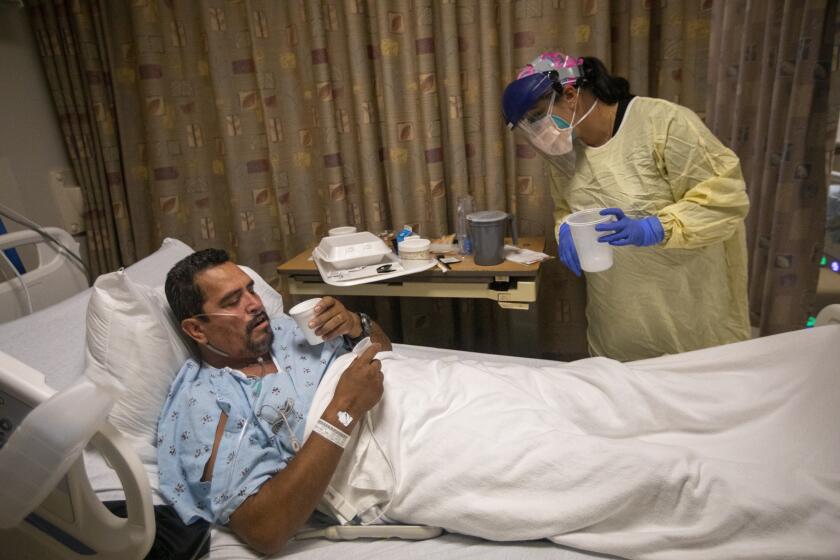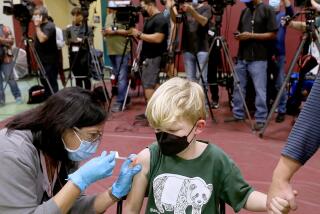Column: By all means, let’s mandate COVID vaccines. There’s just one problem
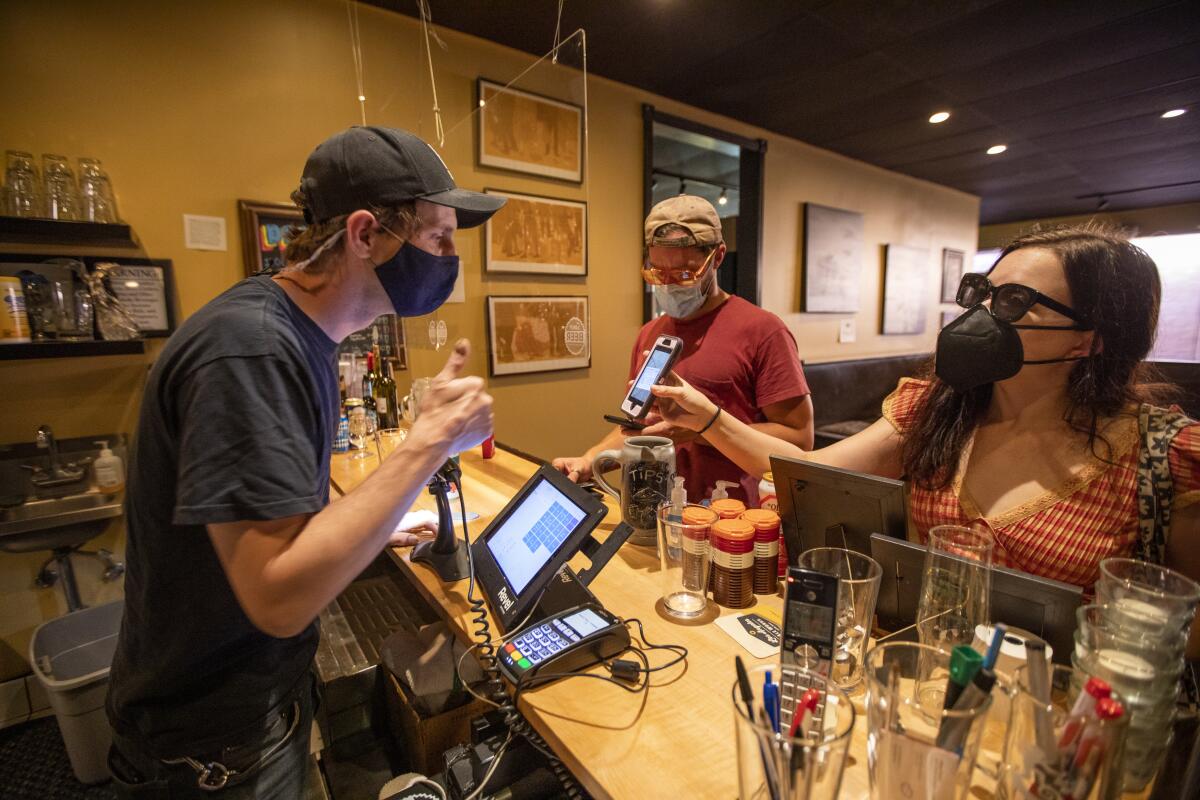
- Share via
Even with her nose and mouth covered by a beige mask, there was no mistaking the exasperation radiating from Los Angeles City Council President Nury Martinez as she spoke from the dais on Wednesday.
“I want to be very clear about something,” she began, her words growing terse. “I’ve heard this on social media and [from] people who call in that they have a right to not access the vaccine or to not get vaccinated. Unfortunately, that argument just doesn’t work for me. The fact that you have the right not to get vaccinated actually impacts me, my life and those of the people that I care about!”
We’ve clearly reached a breaking point here in California. For so long, the mask refusers have been the face of pandemic anger. But now the tables have turned and we, the vaccinated and impatient, have had it!
There are still huge pockets of people in big cities and small towns who haven’t gotten the jab, even though about 77% of those who are eligible have received at least one dose and about 63% are fully vaccinated. And with the highly contagious Delta variant making the rounds, hospitalizations are up, as are the chances that the coronavirus will mutate into an even more deadly strain.
So it was only a matter of time before California decided to do what Texas and Florida have refused to do: make it as inconvenient as possible to live here and remain unvaccinated for COVID-19.
On Wednesday, Gov. Gavin Newsom announced that all employees of schools must get vaccinated or submit to weekly testing — a response to the surge in coronavirus cases among children. This comes after two previous orders, one telling the employees of state agencies to get vaccinated and the other telling healthcare workers to do the same, with limited exceptions.
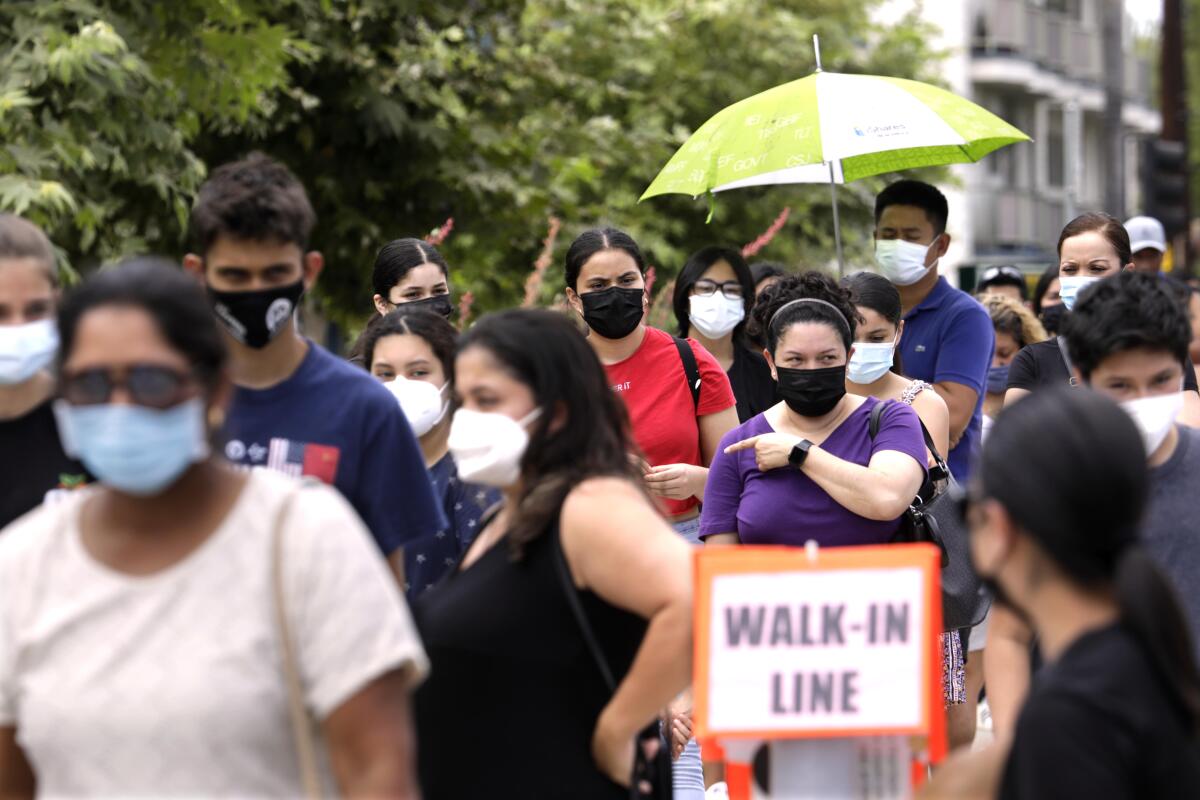
Also on Wednesday, Martinez and the City Council voted 13 to 0 to move forward with a proposed ordinance that would require people to show that they’ve received at least one dose of a vaccine to go indoors at restaurants, bars, retail stores, gyms, spas, movie theaters, stadiums and concert venues.
That vote follows one on Tuesday by the Los Angeles County supervisors, who moved ahead with a similar mandate for indoor public spaces in the unincorporated areas. They also agreed that the county’s 110,000 employees must get vaccinated by Oct. 1.
“If you want to watch a basketball game, a baseball game, go to a concert, a big venue, or even go into a movie theater, you’ll need to get a shot,” Martinez said Wednesday.
Get the latest from Erika D. Smith
Commentary on people, politics and the quest for a more equitable California.
You may occasionally receive promotional content from the Los Angeles Times.
Take that, you unvaccinated Californians!
Well, sorry to be the bearer of inconvenient news, but there’s a slight problem with this otherwise sound, get-vaccinated-or-get-evicted-from-society strategy: It assumes that everyone who is unvaccinated likes it that way.
For sure, plenty of people are selfishly refusing to roll up their sleeves for the greater, moral good. The idiots who keep shouting, “Braveheart”-style, about their “medical freedom,” for example. Or those who, according to a recent study, parrot so many conspiracy theories that they genuinely believe the vaccines pose more of a threat to their health than COVID-19.
But that’s not everyone, especially in Los Angeles. Councilwoman Nithya Raman broke this all down during Wednesday’s meeting.
There’s a white privilege to denouncing everyone who refuses to get a COVID-19 vaccine. For those who are Black, there’s systemic racism to consider.
“While the most vocal opponents to getting the vaccine take up a lot of airtime and a lot of space ... in our thinking on how we respond to this crisis, many of the people who are currently unvaccinated are those who are unable to find time to get vaccinated,” she said. “[People] who are working multiple jobs, or who are providing care for children or for elderly people in their families and are unable to get to the sites.”
Raman ticked off some examples.
“People who look at the vaccine sites and see that you have to put your name and your insurance card and think that you’re not eligible to get vaccinated. People who are afraid to interact with the system for whatever reasons, for reasons of documentation or fear of interactions with the criminal justice system.”
She’s right. According to a Kaiser Family Foundation survey, nearly two-thirds of employees nationwide said their employers had encouraged them to get vaccinated, but only about half got paid time off to do it and to recover from any side effects.
The same survey found that roughly 20% of employees said that they hadn’t gotten vaccinated yet, either because they were afraid of missing work or were too busy — a percentage that jumped to 40% for Latino workers and 26% for Black workers.
This is something people have been saying for months in South Los Angeles.
The L.A. City Council has voted to direct city attorneys to draft a law requiring people to be at least partially vaccinated before heading to indoor sites.
“People are worried, not just about the afternoon that they lose work getting the shot, but whether they have a negative reaction and they can’t make their hours the next day, and their job doesn’t have a lot of protection,” explained Manuel Pastor, director of the USC Equity Research Institute. “And that’s a huge share of Black, immigrant and Latino workers who are in those kinds of really tenuous jobs.”
The good news is both the city of Los Angeles and the state of California have protections in place for workers, spelling out their rights to take paid sick leave to get vaccinated for COVID-19 and recover from side effects.
The bad news is that enforcement can be tricky, especially for those who remain unvaccinated, live paycheck to paycheck and work in L.A.’s sprawling underground economy.
“If you’re an undocumented worker, working, throwing in a fence at people’s houses or doing odd jobs, or if you’re working at the local restaurant, those kind of protections are not there,” Pastor said.
For these reasons, Raman praised the City Council’s decision to examine an expansion of L.A.’s public education campaign on vaccines alongside the plan to mandate vaccinations to enter certain businesses.
California’s coronavirus case rate remains significantly less than Florida and Texas: two common points of comparison given their population size and different pandemic responses.
“Our city has to do more to reach out to them,” she said, “and make sure that they’re getting the information and the resources and the support that they need to get the vaccinations.”
Exercising such patience will be even more important if the current push to require vaccines to enter gyms and bars ever extends to more essential businesses, such as grocery stores.
The L.A. County Board of Supervisors has already ordered staff to consider such a mandate. The L.A. City Council, thus far, has not.
“We’re also not going to deny anyone the ability to access essentials — food, medicine, etc. — regardless of vaccination. That wouldn’t be legal, that wouldn’t be moral,” Councilman Mitch O’Farrell said Wednesday, adding that “what is immoral is choosing not to get vaccinated.”
He’s not wrong.
Implemented wisely, vaccine mandates can be a powerful tool for convincing the unconvinced to get vaccinated. Already, with limited policies in place, the percentage of Californians rolling up their sleeves is increasing and coronavirus cases are slowing, public health officials have said.
Next up? The willing, but unable.
More to Read
Get the latest from Erika D. Smith
Commentary on people, politics and the quest for a more equitable California.
You may occasionally receive promotional content from the Los Angeles Times.
